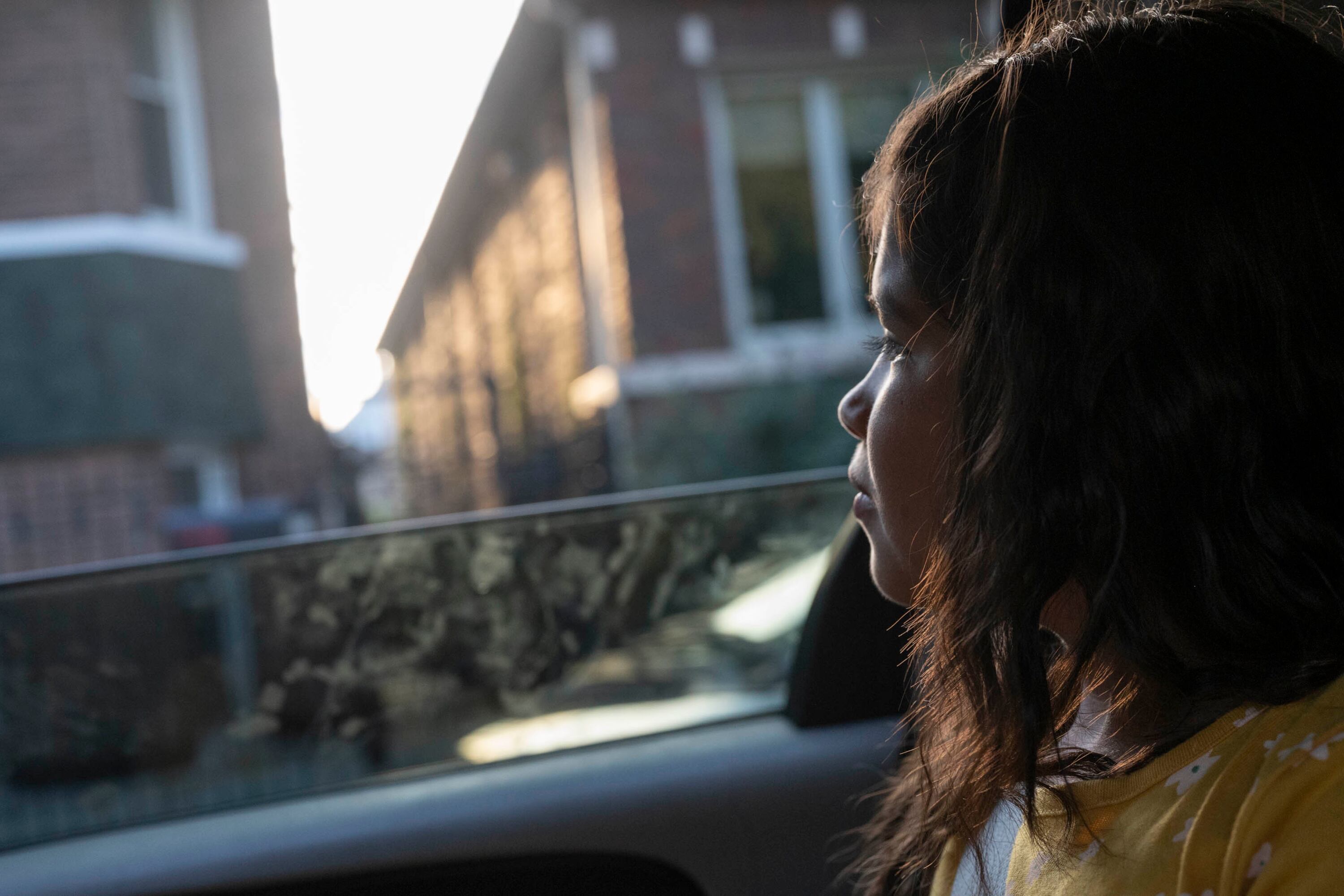HopSkipDrive provided the solution when Jerene Petersen was struggling to find rides for foster youth who had been placed in homes far from their regular schools.
At the time, she was the deputy executive director for the Colorado Department of Human Services. She knew that getting students back to their home schools would increase their chances of graduating high school and building stable lives. It’s also required by federal law — but drivers were hard to find.
HopSkipDrive — a rideshare service similar to Uber or Lyft that specializes in transporting children — now contracts with more than a dozen Colorado school districts, as well as human services agencies, to provide rides for vulnerable children: homeless youth, those in foster care, and students with disabilities whose specialized education plans include transportation.
But as a rideshare company, HopSkipDrive hasn’t been regulated like other companies that also provide rides for at-risk students. Those companies have to follow Colorado Department of Education rules that ensure drivers have certain training and vehicles meet safety requirements.
Instead, HopSkipDrive has been regulated like other rideshare companies by the state Public Utilities Commission.
That was set to change this summer. In response to a complaint from a competitor, the PUC ruled that it shouldn’t regulate HopSkipDrive when the company is doing work for school districts. The Colorado Department of Education is prepared to take over regulating HopSkipDrive’s school services.
A bill making its way through the Colorado General Assembly would prevent the education department from assuming oversight and keep regulating HopSkipDrive similar to Uber and Lyft.
HopSkipDrive executives say that if the bill doesn’t pass, all of their services for at-risk youth and others are in danger because contracts with human service agencies and youth shelters could also be found not to be covered under rideshare regulations. They say the company already follows important safety measures through company policy and their contracts.
But advocates for students with disabilities are raising an alarm about the bill. Colorado’s laws and rules governing rideshare companies were developed with adult passengers in mind, and they want all companies providing rides for students to follow the same standards set by the education department.
“There is no reason that a child, by reason of their disability, should be getting transportation with fewer safety regulations than a child riding a yellow school bus,” said JoyAnn Ruscha, who represents the Colorado Cross-Disability Coalition. “We can’t serve at-risk students by cutting corners. Then we’re not serving kids.”
What would it take to put your child in a car with a stranger?
HopSkipDrive was founded in California by three working mothers who wanted a solution to a problem they had themselves: how to get children to after-school activities when school lets out hours earlier than the workday ends.
Trish Donahue, HopSkipDrive vice president for legal and policy, said the company knew parents would need to feel safe, so they took extra steps. Those included running background checks on drivers, using code words to make sure drivers had the right child and children had the right adult, and requiring previous caregiving experience, though that could include the driver simply being a parent.
The company continues to serve parents directly, but government contracts are an important part of its business. The Los Angeles County Department of Human Services was an early client. Now operating in 10 states, HopSkipDrive entered Colorado in 2018 at the urging of Petersen, who is now retired but continues to volunteer with foster youth. Many of them take HopSkipDrive to school.
Demand has grown during the pandemic as school districts struggle with bus driver shortages, more families face homelessness, and more students need extra services.
In Kansas and Missouri, the company has pushed for bills similar to the Colorado one to be exempt from rules governing school transportation, which covers not just school buses but also vans and private cars that provide rides for individual students.
Donahue said the company seeks to be regulated as a rideshare company because that’s what it is. Drivers and clients connect over an app, and drivers use their own personal vehicles. Having similar regulations in different states supports the company’s business model, and the flexibility of rideshare allows HopSkipDrive to respond quickly to changing demand, she said.
“It doesn’t make sense for us to opt into other forms of regulation,” she said.
Advocates want consistent standards
Other companies doing similar work to HopSkipDrive are considered school transportation and regulated by the Colorado Department of Education. Those rules include maintaining vehicle safety logs, carrying a first aid kit, completing certain training, ensuring students don’t have to cross traffic to get in the car, and more. Districts must maintain compliance records for periodic inspection.
For several years, school districts have raised questions about whether they could contract with HopSkipDrive and what regulations applied. HopSkipDrive’s main competitor for school district contracts, ALC Schools, is regulated as a school transportation service. But the state education department doesn’t regulate HopSkipDrive because it is registered as a transportation network company, or TNC — the technical term for a rideshare company — with the Public Utilities Commission.
“The questions we got were: Why is one company regulated by CDE and one company is regulated by PUC when it’s the same service?” CDE spokesperson Dana Smith said.
So when ALC Schools filed a complaint with the PUC, the education department filed an amicus brief asking the commission to provide clarity. The department was prepared to regulate HopSkipDrive, its lawyers said, but did not take a position on the outcome.
Colorado Secretary of State lobbying reports show that HopSkipDrive previously hired the education department’s legislative lobbyist. The lobbyist, Jennifer Mello, said she did a few hours of work in spring 2020, when schools were closed, helping HopSkipDrive make connections with other government agencies.
The State Board of Education has not taken a position on the bill.
In a ruling on the complaint, an administrative law judge found that when HopSkipDrive contracts with school districts, it provides school transportation and isn’t under the commission’s jurisdiction, though the commission could continue to regulate its consumer services. The full commission upheld that decision in March.
Meanwhile, legislation was filed by state Sen. Rachel Zenzinger, an Arvada Democrat, to keep HopSkipDrive entirely under the commission. She said failing to act would endanger a wide range of public services provided by rideshare companies, such as taking seniors to vaccine appointments and foster youth to supervised visits with their parents. The legal arguments applied to determine that school transportation doesn’t fall under the PUC’s jurisdiction might also apply to other government contracts, she said.
“Until we clarify in statute this irregularity, all of these trips that are taking place are unregulated,” she said.
HopSkipDrive made this same argument to the commission — unsuccessfully.
The bill moved quickly through the Senate with broad bipartisan support, though a few Democrats raised concerns around consumer protections, safety for children, and labor rights.
“A 9-year-old with Down syndrome riding alone to school will have the same safety regulations as an adult hailing an Uber on a Friday night,” said state Sen. Robert Rodriguez of Denver.
While a number of local governments and human services agencies are supporting the bill — as are Uber and Lyft — school districts haven’t weighed in.
Parents want safety and care
Frankie Lopez’s 12-year-old son Xavier uses HopSkipDrive to get to Spectra, a specialized school for children with autism.
The school previously contracted with ALC Schools, and Lopez said she was frequently late for work waiting for rides that never came. Now Xavier has the same driver nearly every day through HopSkipDrive. The driver drops off her grandson at a nearby school and picks up Xavier. Lopez gets regular notifications when the driver is on her way and when she might be delayed.
The driver is kind, Xavier is happy, and Lopez makes it to work on time.
Lopez said she wouldn’t want regulations to be so stringent they deter people from driving for HopSkipDrive.
“CPR and first aid certification is great. I would support them having that,” Lopez said. “But I don’t want to lose what we have. They’re very caring and responsive people, and just going to a class doesn’t provide someone with that care.”
The bill is now awaiting a hearing in a House committee. Disability advocates are hoping to see amendments that would provide more safety regulations. Ruscha said HopSkipDrive provides a valuable service and current education department rules may need updating for a new era. But the education department is the right agency to oversee these rides, she said.
HopSkipDrive is the only company providing school transportation in Colorado that’s regulated as a rideshare company. Even if the company has good practices, Ruscha said, the bill could open the way for new operators, though Donahue said school districts would continue to have stringent requirements.
Disabled students with diverse needs require the same protections no matter who is driving or what district they’re in, Ruscha said.
“Some students might be runners,” Ruscha said. “They might be more likely to become agitated and try to bolt from the car. There are students who might have epilepsy. Having first aid training is really important.
“All drivers would benefit from ongoing professional development, and we do not want to remove that standard for one vendor because they happen to also have an app.”
Bureau Chief Erica Meltzer covers education policy and politics and oversees Chalkbeat Colorado’s education coverage. Contact Erica at emeltzer@chalkbeat.org.







